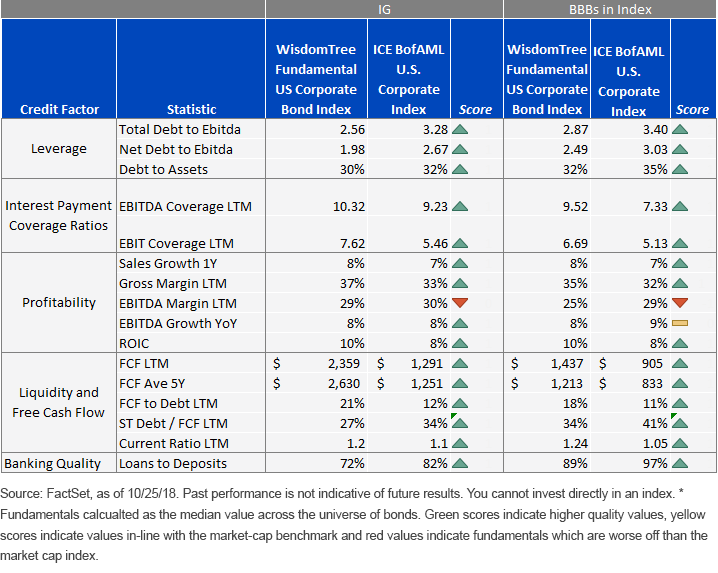Fundamental Score Card for Investment-Grade Corporates



In recent weeks, many investors have started to question the state of U.S. credit markets. To aid in this analysis, we have compiled a Fundamental Score Card for the U.S. corporate bond market. Central to our analysis is understanding the overall quality of the various indexes. In developing our suite of fundamentally weighted strategies, our research identified deteriorating cash flows, rising leverage and weakening profitability compared to peers as effective markers for potential credit concerns.
For companies in the U.S. corporate bond universe with publicly available financials (90% of the ICE BofAML U.S. Corporate Index), we examine fundamental credit metrics including leverage ratios, coverage ratios, profitability and banking quality. While none of the current fundamentals are necessarily flashing red, we believe investors should be taking a closer look at the underlying risks they’re assuming in their portfolios.
Leverage and Interest Coverage Ratios
When leverage is deployed effectively, investors win. The total leverage ratio for the WisdomTree Fundamental U.S. Corporate Bond Index (WFCIG) is only 2.56x while the total leverage ratio for the market-cap index is 3.28x. This is consistent for both the investment-grade universe as a whole and the BBBs within WFCIG. Notice the total leverage for BBBs in WFCIG is only 2.87x compared to 3.40x in the market-cap index. When examining leverage through other lenses such as net debt to EBITDA or debt to assets, similar patterns emerge.
In terms of interest coverage ratios, a common rule of thumb is for businesses in most industries to maintain a comfortable cushion of at least 3.5x EBIT to interest expense. While market-cap-weighted approaches currently pass with coverage in excess of 5x, our fundamental approach sports a near 40% improvement in interest coverage ratios. In our view, this additional margin of safety puts these businesses on an even more stable footing should the economy decelerate over the next several years.
Fundamentals Score Card for Investment-Grade Indexes as of 10/25/18

Profitability, Cash Flow and Quality
The primary reason why corporate balance sheets remain reasonable by historical standards has been the sustained levels of above-trend profitability. High single-digit sales growth, attractive margins and near double-digit earnings growth portend a benign credit environment. Similarly, robust free cash flow and low levels of liquidity risk also point to a manageable level of risk. Perhaps the only potential storm cloud on the horizon is the BBB segment of the banking sector. With loan to deposit ratios rising to almost 100% in market-cap-weighted approaches, we are continuing to monitor this development. However, with other corporate balance sheets looking strong overall, it could be a factor of banks seeking to be more aggressive in improving their own profitability.
Takeaways
Investors ultimately care about performance. In our view, some investors may have been lulled into a false sense of complacency amid the current bull market. By anchoring bond portfolios to fundamentals, we believe our approach has the potential to avoid the pitfalls that will likely emerge as we enter the later stages of the credit cycle. By avoiding potential downgrades, WFCIG has the ability to boost returns and limit volatility relative to market-cap-weighted approaches. Based on our research, we believe the score card suggests that WFCIG has identified issuers with stronger credit fundamentals. Across all categories of credit factors, we see improved metrics for the WisdomTree Fundamental Index. Ultimately, we believe that all these metrics suggest the issuers in the suite of WisdomTree Fundamental investment-grade indexes are in a stronger position to make interest payments and repay their debts.



